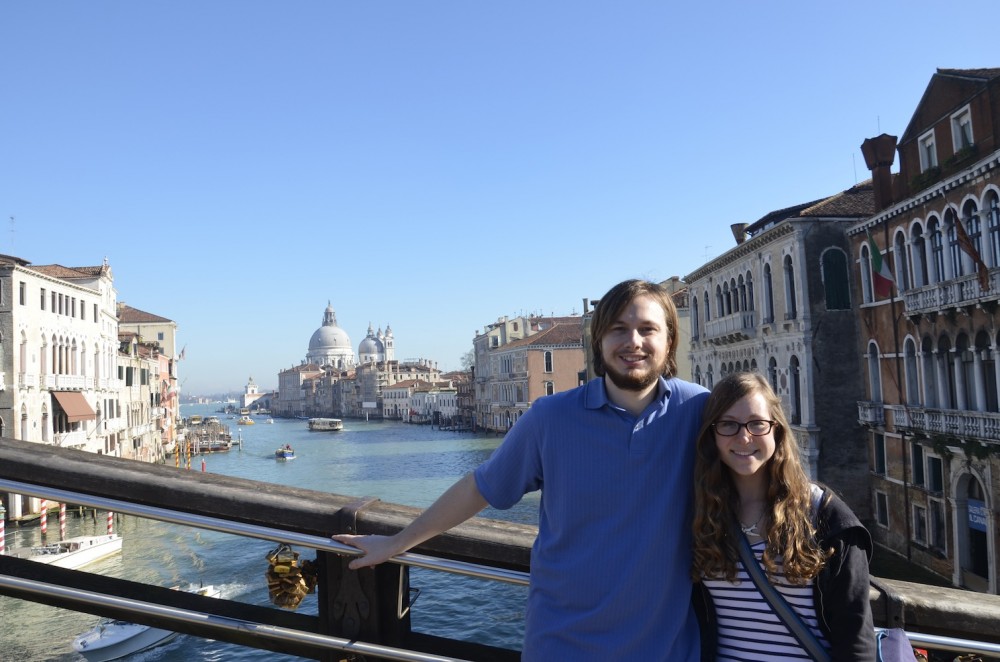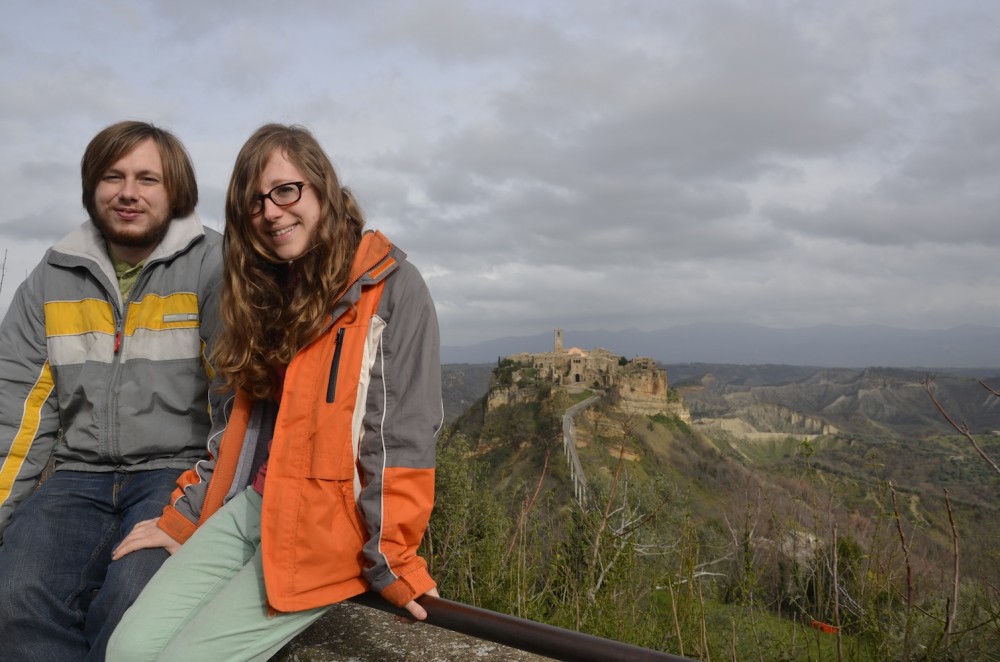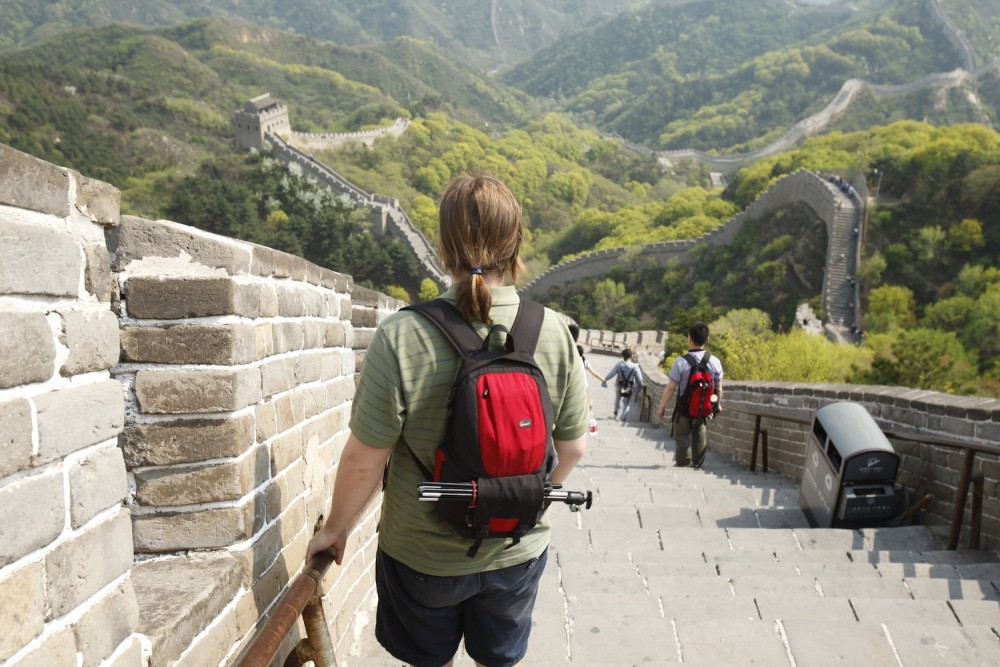Every now and then I come across someone whose creativity and determination inspires my socks off. Someone whose passion and dream is bigger than their fear, or the obstacles of time and money.
Drew and Caroline Macomber two such someones.
We “met” them when we hired Caroline as our kids’ art teacher a couple of years ago, and she started piping herself into our homes and hotel rooms as we continued traveling, to discuss form and theory, line and pigmentation with our kids. (She’s fantastic, by the way, if you’ve got kids and you need an art teacher, let me connect you!)
In addition to teaching art to traveling kids as she travels herself, Caroline and Drew run the website Travel Is Free, dedicated to helping the penniless of the world fulfill their dreams of long term travel by circumventing the biggest obstacle most people seem to face: Money.
They travel full time, and they do it for free. Have I got your attention yet? Even better, they show you how you can do it, too! Interested? Drew and Caroline took the time to chat with me about their story and how they’ve discovered that world travel really can be had for free.
Tell us your story: Who are you? What did you do? Where have you been? Inspire me!

Three years ago we decided to test a theory: a theory that using our knowledge of travel rewards points would allow us to live a nomadic life for no more than the cost of a stationary life. That meant giving up our rented townhouse, but trading it in for four and five star hotels around the world, acquired with copious amounts of hotel points. All the while, we’ve kept a record of exactly what we spend in miles, points and money so that we can analyze what’s working and what isn’t.
That journey has taken us to 61 different countries across every inhabited continent, not to mention some top-rated hotels we’d never be able to afford otherwise. To be honest, we wouldn’t be able to afford a stitch of this without miles and points. We’re just two goofy twenty-somethings with a high tolerance for last-minute plans and above average familiarity with loyalty programs.
“We also believe we can achieve this travel lifestyle for under a poverty level budget. So we try to make sure that all our food, flights, boat rides, etc… all such costs come in under $20,000 a year for both of us.”
We also believe we can achieve this travel lifestyle for under a poverty level budget. So we try to make sure that all our food, flights, boat rides, etc… all such costs come in under $20,000 a year for both of us. And we post all of our spends to prove it’s possible.
We work together to run the site Travelisfree.com, (voted “Best Travel Hacker of the Year” for the last two years), a site that provides resources for learning how to do this yourself. (Our expense stats can be found at the sister site, freakinfliers).
Currently we’re sending this from Egypt, and our next stop is Namibia.
So, that is what “we do,” as we’re full time travelers and full time travel hackers. It also explains some of who we are. Our life really is travel. For instance, we fly flights just for miles (if we can flip the perks), and we sometimes pick destinations based on crazy hotel deals or mistake fares.
It’s kind of a hobby and kind of a lifestyle. I wouldn’t just collect miles to not use them, but since we’re so on top of it all, we can do all this travel.
What is the one thing you learned from travel you could never have learned in a classroom?
Simply put, you fear things you don’t know. So going to SE Asia for the first time might seem scary… until you get there. And in the same way, cultures or groups can be villified in this terrible “us vs them” kind of way.
“Travel offers a chance to dismantle the fears we’ve (often unintentionally) been taught to have.”
But what I’ve learned traveling is that people are all the same. Even our “enemies” call us enemies because they have the same human reactions we do. They have the same fears and drive to protect their family, to provide, and to live. Travel offers a chance to dismantle the fears we’ve (often unintentionally) been taught to have.
How did your gap year change your life upon “return.”
Maybe our blog should be called the gap life?
Well, we discovered that we are more comfortable being nomadic than not, so we adopted it as a lifestyle. We are more fulfilled traveling, being together and working for ourselves than being apart 75% of our waking time and investing in someone else’s future. So coming back to “normal” life has its appeals, but it doesn’t take us very long to realize that it’s good, but it’s second best for us.
What, in your opinion, is the single greatest factor that keeps people from traveling?
Fear. A lot of people honestly don’t have the money, and they simply don’t know about travel hacking, or don’t have good enough credit to even get a rewards card (and thus use travel hacking as we do). So, that may be a different reason.
But on the other hand, a lot of people value security more than freedom. We don’t. We don’t have health insurance, we don’t work for other people, we don’t have a home. We live out of hotels, and that is apparently a hard thought for some people. For us, it’s a no brainer.
What enabled you?

Travel is something I have always talked about a lot, but I really honestly think that travel hacking eased me into it. I would have just kept saving up forever, with the goal of travel in mind. But in our first year of travel hacking we accumulated 1.5 million miles just from credit card bonuses (and our credit score went up somewhere around 50 points, too). That’s enough for at least 25 round trips to Europe. So that covered a huge number of expenses and gave us the freedom to go wherever we wanted, and we knew we always had enough miles to get home.
“We’re not afraid to give up some luxuries if it means our points will cover more hotel nights and our miles will cover more flights.”
Now I’ve learned a lot more about this travel hacking hobby – now I know how to stretch miles and points by cutting out luxuries when I need to, and that helps us to keep a low budget in terms of miles and money. We’re not afraid to give up some luxuries if it means our points will cover more hotel nights and our miles will cover more flights.
What was your biggest obstacle to overcome?
Boy, I don’t mean to make life sound rough… but this may be fitting to share about our first 4 months of marriage. It seemed like we never saw each other or had quality time together because we were obligated to other people’s projects. Primarily my job, at the time, took up a lot of my day. So I would think to myself, “Why did we get married? To see each other on the weekends?”
And then it started to sink in that this is normal.
“So I would think to myself, ‘Why did we get married? To see each other on the weekends?'”
So, I made a semi-vow to never work for anyone else again. Our time would be invested in ourselves from then on out. It was hard to make that philosophy work realistically at first, but I got a hold of some great content on entrepreneurship, and we eventually found some projects to support us.
Your website is aimed at making travel accessible to everyone, regardless of income level. Tell us about that.

Travel Is Free is a blog teaching people about travel hacking. My blog is particularly content heavy on how to use frequent flyer miles to do crazy routes and see tons of places. For instance, we did a trip (for 40,000 miles in all business class) from Guam to the Cooke Islands via New Zealand, Sydney, Singapore, and Tokyo.
That’s not a typical “redemption”, but the thing is, 40,000 miles can be earned with one credit card sign up bonus.
“So, if I could give one tip, it’s to have a rewards card.”
Another thing I discuss in my writings is the fact that people don’t understand credit score very well, so they think that having more accounts is bad. But in reality, your credit score is a rating of how good you are at borrowing money. The more you do it without making errors like late payments, the more your score goes up.
So, if I could give one tip, it’s to have a rewards card. It pains me to see people pull out debit cards or bad rewards cards like CapitalOne which doesn’t transfer to miles. Airline miles have better prices and more lax routing rules than a normal cash-paid ticket. Check out my post on the Best Travel Rewards Cards of 2014 if you just want some basics.
Who did you meet on the road who changed your life? Tell us about that.
There are so many events in our lives that reinforce certain lessons, for better or for worse. So it’s hard to say which events led to which life changes. And therefore I can really only tell you which people get replayed in my head over and over.
In Bali we stayed at this newly built two room homestay, and the owner realized that we were avoiding his adjoined restaurant. We were really just finding the cheapest local spots for our meals and avoiding anything that might be geared for tourists, and therefore more expensive. As soon as he found out we were eating “bakso” and “gado gado” (both local dishes around 50 cents) he told his one staff lady, “When the family eats, Drew and Carrie eat with us.”
“It was incredible to witness such eagerness to give.”
So, for our 11 days there we joined the family meals. Not only that, but he also took us to the family temple, took us fishing, and let us borrow his own scooter. He went above and beyond to make us feel right at home. At the end of our stay there, before we had to fly out, I asked him if we could treat the family to the Bali Hyatt. At the time it was only 5,000 points a night, so it was a tiny redemption for us, but you could tell how big of an event it was for them. In fact he told me, “I may never get to do something like this again, not in many lifetimes.”
Similarly while looking for a locally priced place to eat in Sri Lanka we came across a young girl who knew a little bit of English and wanted to help us. She asked what we were looking for, and we explained that we wanted to eat where the locals eat. She responded that the locals just eat in their homes, and that she would be glad to have us eat at her home. So we were introduced to her family in a little house with no doors and with an open-fire oven.
In both of those stories, it was incredible to witness such eagerness to give. In the case of our Sri Lankan friend, she gave when she had very little. That is a very impacting thing to experience.
Where are you and what are you doing now?
Right now we are in Egypt taking advantage of the many hotels and resorts with cheap award prices. The prices were so good we booked a whole month. Once our time here is finished, we fly to Cape Town and from there, we’ll head to Namibia.
Read the following for more tips to help save money on the road:

Photo credits: PHOTOCREO Michal Bednarek , all other photos courtesy of Drew & Carrie, please don’t reuse them without permission.



